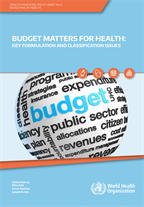Budgeting in health
Overview
Budgets are political and technical tools. They reflect a government’s policy priorities, allow for the efficient use of public resources and ensure transparency and accountability in the use of those resources. Public budgeting is the process by
which governments prepare and approve strategic allocations of public resources. From the perspective of public financial management (PFM), robust public budgeting serves several important functions: it sets expenditure ceilings, promotes fiscal discipline and financial accountability and enhances efficiency in public spending.
.tmb-1920v.jpg?sfvrsn=6d29ac4f_1)
Generally, the key features of a well-functioning budgeting system typically include:
- Multi-year planning and budgeting
- Policy or output-oriented allocation
- Realistic and credible estimates of costs
- Open and transparent consultation processes
In health, countries face challenges at all stages of the budget cycle. Key questions include:
- How to align budget allocations with sector needs?
- How to ensure effective disbursement?
- How to make the budget system more accountable and transparent?
Budget formulation is an important part of the budgeting process. The choice of budget classification is crucial for actual spending as it largely defines how money is received and spent by different budget holders, as well as how the money is controlled and accounted for. Because programme budgets force the allocation and appropriation of public resources by policy goals and outputs, they are one of the most promising PFM mechanisms to help link public resources to priorities and needs for a sector.
The evidence shows that budget formulation reforms can have a significant effect on health budgeting and spending. When reforms are introduced in countries where public spending is driven by rigid input-based allocations, reforms can help improve the alignment of public resources with health priorities and enhance accountability for performance. However, there are more mixed results when it comes to flexibility; reforms do not consistently generate more flexibility in the use of public resources in health.
The COVID-19 crisis has proven that having flexible budget formulation is helpful to channel emergency funding and accelerate spending towards the urgent needs.
Publications
All →Strategizing national health in the 21st century: a handbook
This handbook is designed as a resource for providing up-to-date and practical guidance on national health planning and strategizing for health. It establishes...

Robust public budgeting in the health sector is a necessary condition to enable the effective implementation of health financing reforms towards universal...
Case studies
E-Learning Course
E-learning course on PFM (to be launched soon)
Related Health Topic
Meeting Reports
Contact Us

